High-Performance Polymers: Advanced Products for Sector
High-Performance Polymers: Advanced Products for Sector
Blog Article
Discovering the Varied Applications and Advantages of Polymers in Different Industries
Polymers, with their varied series of buildings and functionalities, have come to be important in numerous sectors, each gaining special advantages from their application. Polymers. From boosting safety and efficiency in the automotive market to changing clinical tools in the medical care industry, polymers play an essential role. Furthermore, their green nature is changing the landscape of sustainability methods. As we dive right into the depths of polymers in electronics, we reveal sophisticated advancements, while their structural integrity changes the realm of construction and infrastructure. The pervasive impact of polymers across industries is a testimony to their adaptability and adaptability, forming the future of plenty of markets.
Automotive Industry Applications
Polymers play an essential duty in boosting the efficiency and durability of numerous elements within the automotive market. One famous usage of polymers in the automotive industry is in the production of light-weight components.

Healthcare Market Advantages
In different medical care applications, the benefits of making use of polymers are extensively identified for their varied range of useful homes. Polymers play a crucial role in the medical care sector as a result of their convenience, biocompatibility, and cost-effectiveness. Among the key benefits of polymers in medical care is their capacity to be customized to certain needs, such as adaptability, durability, and biodegradability, making them excellent for a variety of clinical applications.
Polymer-based materials are extensively used in clinical tools, such as catheters, implants, prosthetics, and medication shipment systems, as a result of their biocompatibility and ability to mimic all-natural cells. These products can reduce the risk of allergies or beings rejected, improving client safety and results. Furthermore, polymers are lightweight, making them appropriate for wearable clinical tools and ensuring patient convenience.
In addition, polymers allow the growth of cutting-edge therapy techniques, such as hydrogels for cells engineering and nanocomposites for targeted medicine delivery. Their simplicity of handling and sterilization makes them essential for preserving high criteria of hygiene in medical care settings. Generally, the diverse benefits of polymers contribute significantly to improvements in medical technology and individual care.
Environmental Advantages of Polymers

Furthermore, polymers can add to power savings due to their light-weight nature. In markets such as transport, light-weight polymer products can assist decrease gas intake and greenhouse gas exhausts. Additionally, polymers can allow the advancement of energy-efficient items such as insulation products that improve power preservation in structures.
Moreover, polymers play an important function in minimizing water air pollution. For instance, using polymer-based filtration systems can effectively remove pollutants redirected here and contaminants from wastewater, safeguarding water sources and ecosystems. Generally, the ecological benefits of polymers make them important assets in advertising sustainability and environment-friendly techniques across various industries.
Polymers in Electronic Devices and Innovation
Taking into consideration the boosting need for cutting-edge and sustainable solutions in modern-day markets, the integration of innovative polymer modern technologies in the world of electronics and technology has actually emerged as a pivotal method for driving efficiency and efficiency. Polymers have actually reinvented the electronics sector by allowing the production of lighter, a lot more flexible, and sturdy digital gadgets. From smartphones to medical gadgets, polymers play an important role in improving product layout and functionality.
One substantial advantage of polymers in electronic devices is their shielding properties, which assist protect fragile electronic elements from ecological elements and electric disturbance. Furthermore, polymers are essential in the advancement of adaptable displays, wearable modern technology, and printed electronic devices, offering limitless opportunities for producing smart and interconnected gadgets.
In addition, the use of polymers in electronic product packaging has resulted in developments in miniaturization and thermal monitoring, boosting the overall performance and integrity of digital systems. As innovation remains to evolve, the flexibility and versatility of polymers will certainly drive additionally development in the electronic devices sector, forming you could try this out the future of modern technology.
Role of Polymers in Construction and Infrastructure
Polymers supply various benefits in the construction market due to their flexibility, durability, and cost-effectiveness. One vital duty of polymers in building is their usage in coatings and sealers, supplying defense against environmental aspects such as wetness, UV radiation, and deterioration.
Additionally, polymers play an important duty in sustainable building practices by allowing the advancement of energy-efficient structures. Protecting materials made from polymers help regulate indoor temperatures, minimizing the requirement for heating and cooling systems and ultimately lowering power consumption. Moreover, making use of polymer-based compounds in infrastructure tasks such as bridges and roads enhances their longevity and lowers upkeep expenses. Overall, the consolidation of polymers in building and construction and facilities showcases their substantial effect on modern design practices.
Conclusion
In conclusion, polymers play a crucial function in different industries such as vehicle, healthcare, environmental, electronic devices, and building. From improving gas efficiency in go to this website lorries to improving medical devices, polymers supply many advantages.
Report this page